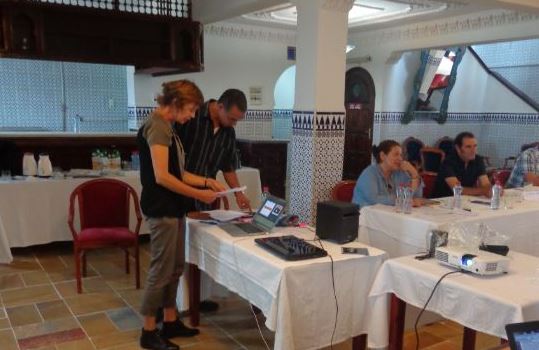Dates: 20 – 24 September 2014
Country: Algeria
 Abd El Djebbar was born in the mountainous region of Sétif in North-East Algeria during the “Black Decade” – the devastating conflict between Muslim extremists and government forces that tore the country apart in the 1990s and killed some 200,000 Algerians. “Abd was the son of Islamist guerillas, born in the ‘maquis’. He is now 18. He doesn’t share his parents’ beliefs – in fact he has condemned them – but he is rejected everywhere he goes, he has no place in society and no future. He is suicidal,” says Zakaria Fetnaci, a young Algerian journalist from Constantine who was participating in five-day course on Reporting Diversity in Algiers.
Abd El Djebbar was born in the mountainous region of Sétif in North-East Algeria during the “Black Decade” – the devastating conflict between Muslim extremists and government forces that tore the country apart in the 1990s and killed some 200,000 Algerians. “Abd was the son of Islamist guerillas, born in the ‘maquis’. He is now 18. He doesn’t share his parents’ beliefs – in fact he has condemned them – but he is rejected everywhere he goes, he has no place in society and no future. He is suicidal,” says Zakaria Fetnaci, a young Algerian journalist from Constantine who was participating in five-day course on Reporting Diversity in Algiers.

Zakaria, along with other journalists on the course, was pitching his story to the demanding editor-in-chief of El Watan, well-respected independent French-language newspaper in Algeria. The journalists were given an intensive training by the Media Diversity Institute (MDI), on 20 – 24 September 2014 in Algiers. Journalist, coming from newspapers and online magazines, were trained in how to write stories about the diverse groups who make up Algerian society, but whose voices are seldom heard in the Algerian media.
“I want to tell Abd’s story. It is the story of the children of the terrorists, of the “repented” – they are treated as pariahs in spite of the 2005 charter of national reconciliation,” says Zakaria.
All participants at MDI workshop have found interesting topics and worked hard researching them. Afterwards, they were presenting them to their colleagues and to El Watan’s editor-in-chief during a staged editorial conference.
Fella Bouredji, an Al-Watan reporter and the guest at the workshop one morning, was playing the editor-in-chief with gusto. She is impressed that Zakaria chose a topic that few would dare to touch, and thinks he showed real journalistic flair and talent in finding Abd and persuading him to tell his story.
She is leaning forward in her seat, eager to hear more of the story, but the atmosphere in the room is changing. During the other pitches, fellow journalists asked questions and offered comments, but now they sit in stony, hostile silence.
Nonetheless, Zakaria continues, explaining that Abd lived in mountains’ caves until he was nine, roaming with gangs, witnessing rapes and murders, and never going to school. When his family reintegrated their village at the end of the war, “he was rejected from school, couldn’t get a job and …”
– “Enough,” cuts sharply another journalist. “I refuse to read anything about terrorists. We shouldn’t give them any voice, any recognition, any space.” Many nod in agreement.
“But he is a child. He didn’t ask to be born to terrorist parents, he doesn’t share their views,” tries Fella.
– “What about the children of their victims? Do they have a voice?” angrily replies the journalist.
Everyone in Algeria is still traumatized by the “Black Decade” and Zakaria’s story hit a raw nerve. But it also generated a passionate and ultimately productive discussion around issues which are at the very heart of our training: how do we talk about other people’s views and experiences, especially when they disturb us? Isn’t it better to hear what a segment of the population has to say, even if we don’t agree with them?
You might believe that “terrorists” shouldn’t have a voice, but other people in Algeria believe that the refugees, homosexuals, Christians and many other groups shouldn’t either.
In addition to Zakaria’s story on the plight of the children of “terrorists”, other stories the journalists produced during the course included the story on children with disabilities being rejected from mainstream education, how Adventist Christians are rejected both by Muslims and Christians and a story about Sub-Saharan immigrants facing discrimination in Algeria.
The stories were produced at the workshop organised as part of the project “Inclusive Media for an Inclusive Society: Building the presence of youth and marginalised voices in Algeria”, supported by the UK Foreign and Commonwealth Office.
